When it comes to selecting the ideal freestanding bathtub, the choice of material plays a pivotal role in influencing both functionality and aesthetics. Stone resin, with its remarkable durability and non-porous surface, offers a sophisticated yet practical option, while copper provides a touch of luxury and impressive thermal conductivity. Cast iron, known for its robustness and heat retention, contrasts with the lightweight and easily installed acrylic. Each material—whether fiberglass, porcelain, or even wood—presents unique advantages and considerations. But what distinct benefits make stone resin a compelling choice among these varied options?
- Stone resin bathtubs are highly durable, non-porous, and resistant to stains and scratches, offering a modern, luxurious appearance.
- Cast iron bathtubs provide exceptional durability and heat retention but require reinforced floors due to their significant weight.
- Acrylic bathtubs are lightweight and easy to install but are less resistant to scratches and stains compared to stone resin.
- Copper bathtubs offer excellent thermal conductivity and a unique patina but require diligent maintenance to prevent tarnishing.
- Fiberglass bathtubs are cost-effective and lightweight but are prone to scratches, cracks, and fading over time.
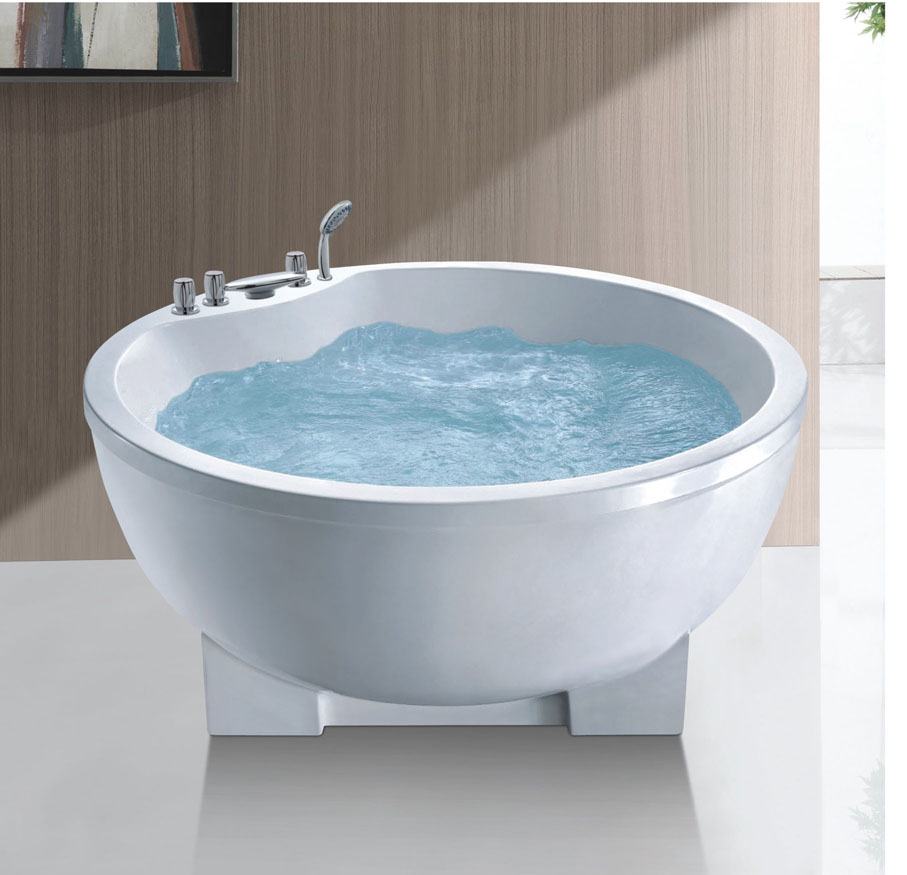
When comparing stone resin and cast stone bathtubs, it is crucial to evaluate their composition, durability, and aesthetic qualities to determine the most suitable option for your needs.
Stone resin bathtubs are crafted using a blend of natural stone and resin, resulting in a highly durable and non-porous material. This composition guarantees resistance to stains, scratches, and extreme temperatures, making stone resin an excellent choice for long-term use. Additionally, the smooth, matte finish of stone resin bathtubs offers a modern and elegant appearance, enhancing the overall aesthetic of any bathroom.
In contrast, cast stone bathtubs are made from a mixture of crushed stone and a binding agent, typically cement. This combination yields a heavier and often more robust structure compared to stone resin. Cast stone bathtubs also provide exceptional durability and a high level of thermal retention, securing a luxurious bathing experience. The surface can be finished to mimic natural stone, offering a variety of design options. However, their heavier weight may necessitate additional structural support during installation.
In evaluating stone resin versus acrylic tubs, it is essential to assess their individual material characteristics, durability, and maintenance needs to determine the best choice for your bathroom.
Stone resin, composed of natural stone and resin composite, provides a robust, non-porous surface that is highly resistant to scratches and stains. This material retains heat well, offering a luxurious and prolonged bathing experience. Additionally, stone resin's weight contributes to its stability but may pose installation challenges due to structural requirements.
On the other hand, acrylic tubs, made from vacuum-formed sheets of acrylic reinforced with fiberglass, are notably lighter, facilitating easier installation and transportation. Acrylic is also known for its flexibility, allowing for diverse design options. However, it is more susceptible to scratching and may discolor over time if not properly maintained.
In terms of maintenance, stone resin requires minimal upkeep, usually involving simple cleaning with non-abrasive cleaners. Acrylic tubs demand more frequent care to maintain their appearance and prevent damage.
Comparing stone resin and cast iron bathtubs involves examining their material properties, durability, and maintenance requirements to determine the most suitable option for a high-quality bathroom installation.
Stone resin bathtubs are composed of a blend of natural stone and resin, producing a material that is both lightweight and robust. This combination offers excellent heat retention, ensuring the bathwater remains warm for extended periods. Moreover, stone resin's smooth, non-porous surface is resistant to stains and easy to clean, reducing the need for rigorous maintenance.
Conversely, cast iron bathtubs are renowned for their exceptional durability and heat retention capabilities. Fabricated by coating molten iron with a thick layer of enamel, these bathtubs are virtually indestructible, making them a long-term investment. However, their significant weight necessitates a reinforced floor for installation, which can complicate the installation process.
Maintenance-wise, the enamel coating on cast iron can chip over time, potentially leading to rust and necessitating periodic refinishing. In contrast, stone resin's inherent resistance to chipping and cracking minimizes maintenance concerns.
Ultimately, the choice between stone resin and cast iron bathtubs hinges on the balance between ease of installation, maintenance frequency, and the desired aesthetic and tactile qualities.
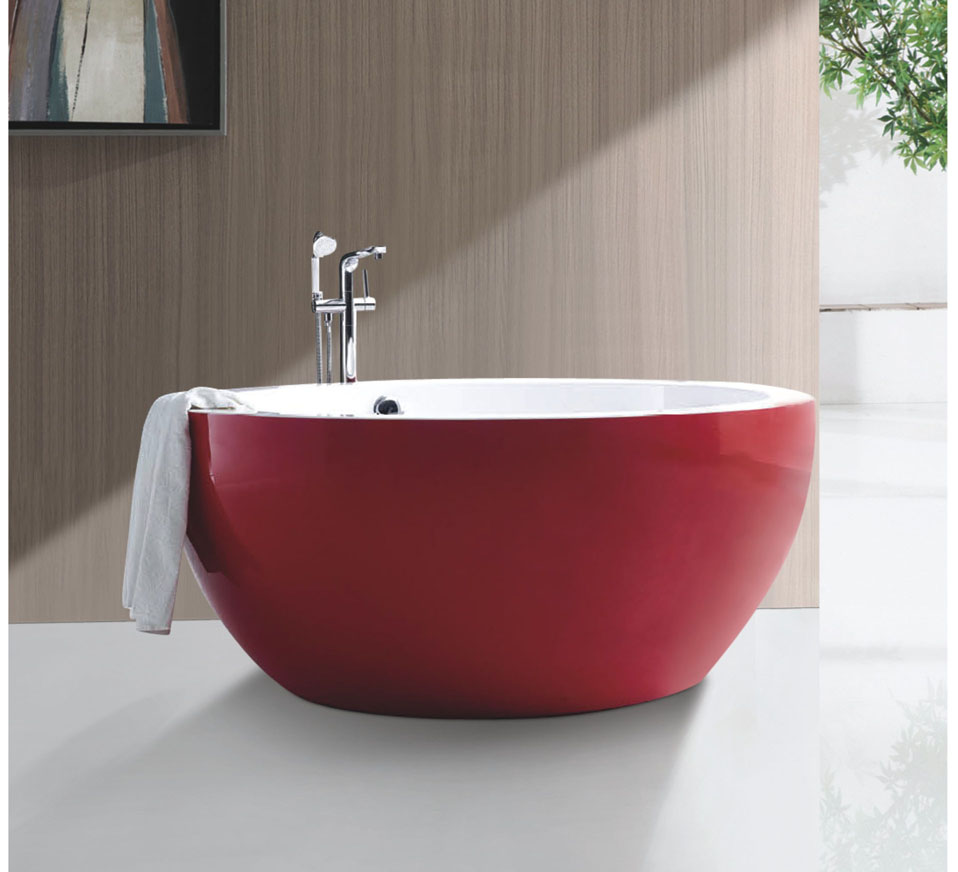
Evaluating stone resin and fiberglass tubs requires a thorough analysis of their respective material compositions, durability, and maintenance requirements to determine the best choice for modern bathroom environments.
Stone resin, typically made up of a combination of natural stone and resin, is well-known for its strength and longevity. The material offers a solid, non-porous surface that resists scratches, stains, and discoloration, ensuring a lasting aesthetic appeal. Additionally, stone resin tubs maintain water temperature effectively, providing a luxurious bathing experience.
In contrast, fiberglass tubs are made using reinforced plastic and are recognized for their lightweight and cost-effectiveness. While fiberglass tubs are generally more affordable and easier to install due to their lighter weight, they fall short in terms of durability. The surface of fiberglass tubs can be prone to scratches, cracks, and fading over time, requiring more frequent maintenance and potential replacements.
Maintenance for stone resin involves simple cleaning with non-abrasive products, whereas fiberglass may require more intensive cleaning regimens to prevent surface deterioration.
In relation to aesthetic versatility, stone resin offers a wider range of design options, catering to various stylistic preferences. Ultimately, for those prioritizing durability and long-term investment, stone resin emerges as the superior choice.
When considering the benefits of stone resin compared to porcelain bathtubs, it is crucial to evaluate their material characteristics, durability, and maintenance needs.
Stone resin bathtubs are a combination of natural stone and resin, resulting in a strong and silky-smooth material. This blend ensures excellent heat retention, providing a consistently warm bathing experience. Additionally, stone resin is highly resilient to chipping and scratching, guaranteeing long-lasting durability.
On the contrary, porcelain bathtubs are typically created by covering a steel or cast iron base with a layer of porcelain enamel. While porcelain offers a traditional, shiny finish that is visually appealing, it is prone to chipping and cracking over time, particularly when exposed to significant impacts. Furthermore, the enamel coating can deteriorate, leading to rust formation on the underlying metal.
Regarding upkeep, stone resin bathtubs need minimal maintenance since their impermeable surface resists stains and is easy to clean.
In contrast, porcelain bathtubs may require more frequent cleaning and upkeep to prevent staining and address any potential chips or cracks in the enamel.
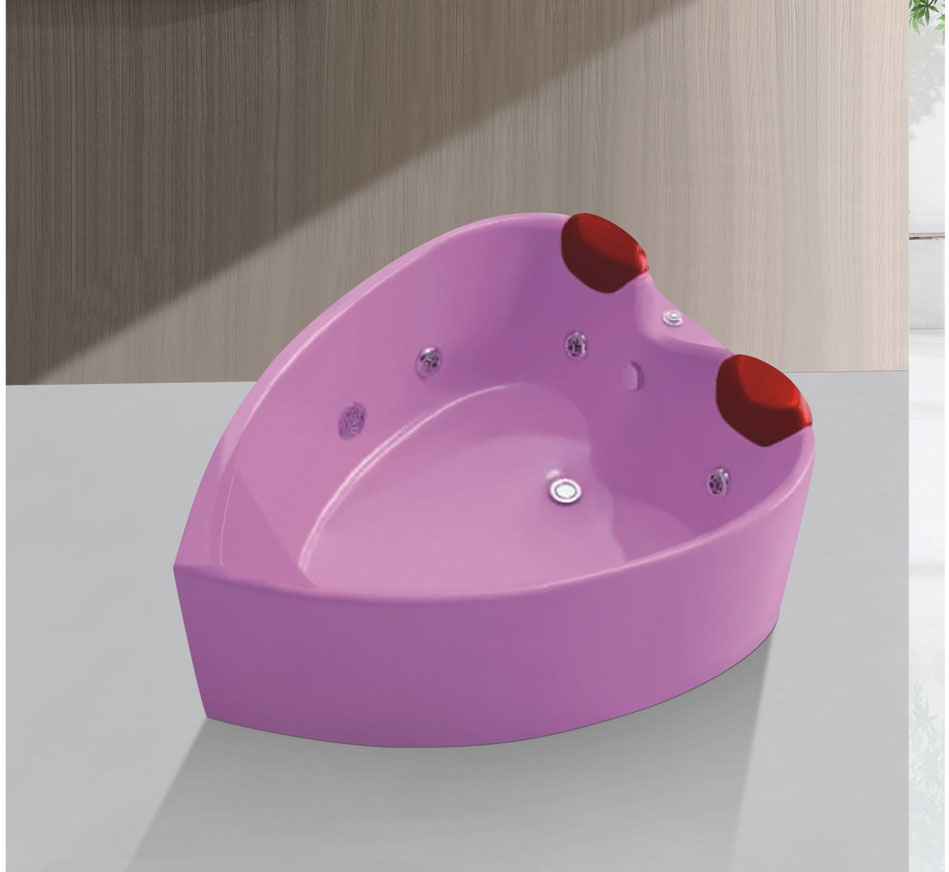
In the world of high-end bathroom fixtures, stone resin and copper bathtubs each bring their own unique aesthetic and functional advantages to the table.
Stone resin bathtubs are crafted from a blend of natural stone and resin, resulting in a durable, non-porous surface that is highly resistant to stains and scratches. Their ability to retain heat enhances the bathing experience, while their smooth, matte finish provides a modern, luxurious appearance. Moreover, stone resin is relatively low-maintenance, requiring only routine cleaning to maintain its pristine condition.
Copper bathtubs, on the other hand, offer a distinct aesthetic characterized by their rich, warm hue and natural patina that develops over time. Copper is renowned for its excellent thermal conductivity, allowing the bathtub to quickly reach and maintain a comfortable temperature. This material also has natural antibacterial properties, making it a hygienic choice for the bathroom.
Nonetheless, copper bathtubs require more diligent maintenance to prevent tarnishing and maintain their appearance. They can also be susceptible to dents and scratches if not handled carefully.
Although both stone resin and porcelain-enameled cast iron bathtubs offer robust durability and a touch of luxury, they differ noticeably in their material composition, weight, heat retention, and maintenance requirements.
Stone resin bathtubs are crafted from a blend of crushed stone and resin, resulting in a lightweight yet sturdy product. In contrast, porcelain-enameled cast iron bathtubs consist of a heavy iron base coated with a layer of porcelain enamel, making them considerably heavier.
In terms of heat retention, stone resin bathtubs excel due to their inherent insulation properties, allowing for longer, more comfortable bathing experiences. Porcelain-enameled cast iron bathtubs also retain heat well but may cool down faster than their stone resin counterparts due to the thermal conductivity of the metal core.
Maintenance is another area where these materials diverge. Stone resin bathtubs are generally low-maintenance, requiring only mild soap and water for cleaning. The non-porous surface of stone resin also resists stains and scratches effectively.
Conversely, porcelain-enameled cast iron requires more careful upkeep to prevent chipping or cracking of the enamel, which can expose the underlying iron to rust.
Comparing stone resin and stone bathtubs reveals significant differences in their construction, weight, and aesthetic appeal.
Stone resin bathtubs are composed of a blend of crushed stone and resin, which is then molded into shape. This combination offers a lighter weight alternative to natural stone while maintaining a similar visual appearance. In contrast, stone bathtubs are crafted from solid blocks of natural stone such as marble, granite, or limestone. This makes them considerably heavier and often necessitates reinforced flooring to support their substantial weight.
From a construction standpoint, stone resin bathtubs benefit from the uniformity provided by the manufacturing process, allowing for consistent shapes and smoother finishes. Natural stone bathtubs, however, often feature unique veining and natural imperfections, contributing to their bespoke appeal.
In terms of maintenance, stone resin surfaces are typically non-porous, which makes them more resistant to stains and easier to clean. Natural stone, while highly durable, is porous and may require periodic sealing to prevent water absorption and staining.
Aesthetically, stone bathtubs provide a luxurious, one-of-a-kind look due to their inherent uniqueness and natural beauty. Stone resin bathtubs, while also elegant, offer a more cost-effective solution without compromising on style.
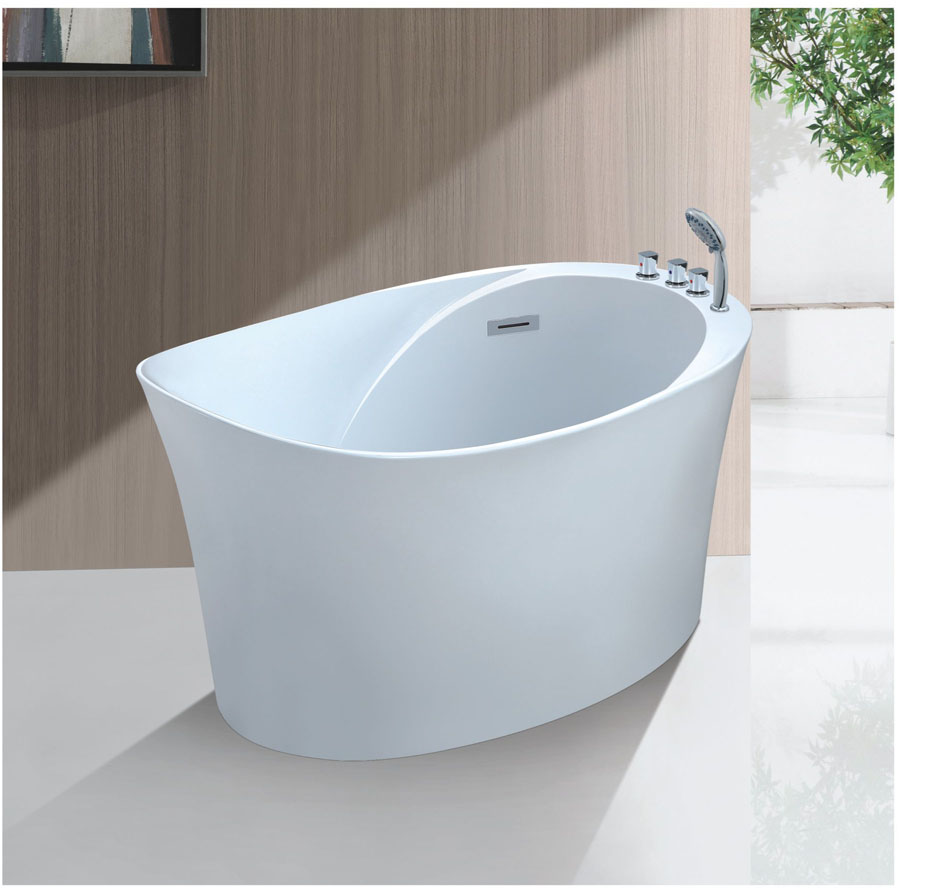
Shifting focus away from comparing stone resin and stone bathtubs, it is pertinent to examine the differences between stone resin and wood bathtubs, particularly regarding material properties, durability, and maintenance requirements.
Stone resin, composed of natural stone and resin, offers a robust and non-porous surface that resists stains and scratches. Its thermal properties guarantee water retains its temperature longer, enhancing the bathing experience.
In contrast, wood bathtubs are crafted from hardwoods such as teak or cedar, which provide a unique aesthetic characterized by natural grain patterns. However, wood is inherently porous and requires frequent sealing to prevent water absorption and potential warping.
In terms of durability, stone resin bathtubs are less susceptible to cracking and chipping compared to their wooden counterparts, which may suffer from splintering or rotting over time if not meticulously maintained.
Maintenance of stone resin is relatively simple; regular cleaning with mild detergents suffices. Conversely, wood bathtubs demand more intensive care, including periodic resealing and protection against mold and mildew.
Ultimately, while wood bathtubs offer a distinctive and organic appeal, stone resin bathtubs provide superior durability, easier maintenance, and enhanced performance, making them a practical choice for modern bathrooms.
One of the main reasons to consider a stone resin freestanding bathtub is its exceptional durability, which ensures a long-lasting investment for any bathroom. Engineered from a combination of natural stone and resin, these bathtubs are remarkably resilient to cracks, chips, and other forms of damage. The robust composition guarantees that the bathtub maintains its structural integrity and aesthetic appeal over extended periods of use.
In addition to durability, stone resin bathtubs offer superior thermal retention properties. This characteristic allows the bathtub to retain heat for longer durations, enhancing the bathing experience by keeping the water warm. Homeowners can, therefore, enjoy prolonged, relaxing soaks without the need for constant refilling.
Aesthetically, stone resin bathtubs are highly versatile. They can be molded into a variety of shapes and sizes, offering a wide range of design possibilities to complement any bathroom decor. Furthermore, the surface finish can be customized to mimic natural stone, providing an elegant and luxurious appearance without the associated maintenance challenges of real stone.
Lastly, stone resin is an eco-friendly material, composed of natural minerals and recyclable resins, making it a sustainable option for environmentally-conscious consumers.
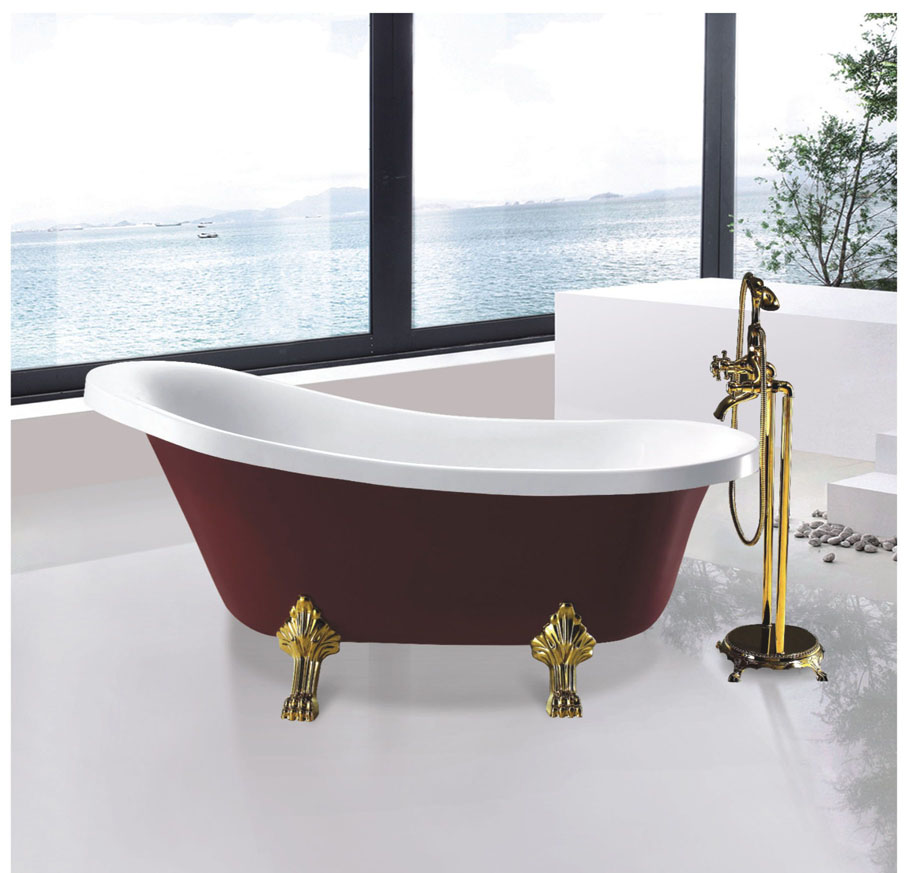
Surprisingly, stone resin bathtubs, despite their solid appearance, enhance bathroom acoustics by reducing echo and sound reverberation. Their dense material absorbs sound waves effectively, contributing to a quieter and more serene bathing environment.
Yes, stone resin tubs are suitable for outdoor installations due to their durability, resistance to temperature fluctuations, and UV stability. Proper sealing and maintenance can further enhance their longevity and performance in outdoor environments.
The weight limit for a stone resin bathtub is robust, akin to the strength of reinforced concrete. Typically, these tubs can support up to 1,000 pounds, ensuring durability and stability for various user requirements.
Yes, stone resin bathtubs can be customized regarding shape and size. This material allows for a high degree of flexibility in design, enabling bespoke solutions to meet specific architectural and aesthetic requirements.
Stone resin bathtubs exhibit superior thermal retention compared to acrylic and copper, but are generally outperformed by cast iron. This retention capability guarantees sustained warmth, enhancing user comfort and reducing the frequency of water reheating.